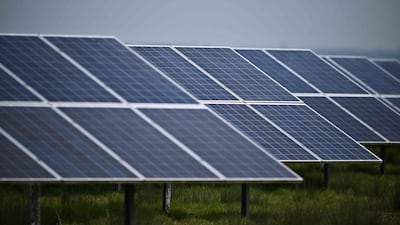UK prime minister Liz Truss opposes the installation of solar panels on productive agricultural lands, Downing Street has said, as a new cost-of-living battle plays out.
Her clarification came amid reports that ministers want to restrict development of solar projects on farms in England, with Environment Secretary Ranil Jayawardena understood to favour protecting farmland for food security.
Ms Truss’s office has said she does not support solar panels being built on farmland that can be used to grow food.
But experts say blocking or limiting solar development could stymie the growth of clean electricity generation that has the potential to supply millions of English homes with low-cost power.
“She doesn’t think we should be putting solar panels on productive agricultural lands, because, obviously, as well as the energy security issue, we face a food security issue,” the prime minister’s official spokesman said.
“So, we need to strike the right balance,”
Pressed on whether farmers or the government should decide how to use farmland, the official added: “Of course it is right that farmers who own farms decide how best to use it, and I think she was clear about that during the [leadership election] campaign.”
Changes to the type of land available for developers could slash investment in one of the cheapest forms of electricity in Britain just as the treasury pays out billions of pounds to subsidise soaring energy bills, industry experts have said.
“The UK solar sector is alarmed by attempts to put major planning rules in the way of cheap, home-grown energy,” said Chris Hewett, chief executive of industry body Solar Energy UK.
“Solar power is the answer to so many needs and policy demands. It will cut energy bills, deliver energy security, boost growth and help rural economies.
“Ranil Jayawardena’s opposition to solar farms must surely make him part of the anti-growth coalition.”
The government plans to set out details about how to increase food security later this year.
Planning guidance will continue to encourage the development of large solar projects on land that had already been developed.
“The environment, farming and economic growth go hand-in-hand, and as stated in the growth plan, we are committed to increasing our long-term energy security and strengthening the UK’s food security,” a spokesperson at the Department for Environment, Food and Rural Affairs said.
“That’s why we will be looking at the frameworks for regulation, innovation and investment that impact farmers and land managers to make sure that our policies are best placed to boost food production, increase resilience, drive growth and protect the environment.”
While wind power dominates the UK renewables sector, solar still plays an important role.
It has been growing steadily and can complement wind, producing energy during hot summer days when there is no wind to turn the country’s turbines.
There are at least six gigawatts of planned solar farms in the UK that already have the necessary permits and will be built in the coming years.
But there are as many as 30 gigawatts of projects, or enough to power more than eight million British homes, that likely would not get built if the planning rules were to change, Mr Hewett said.


